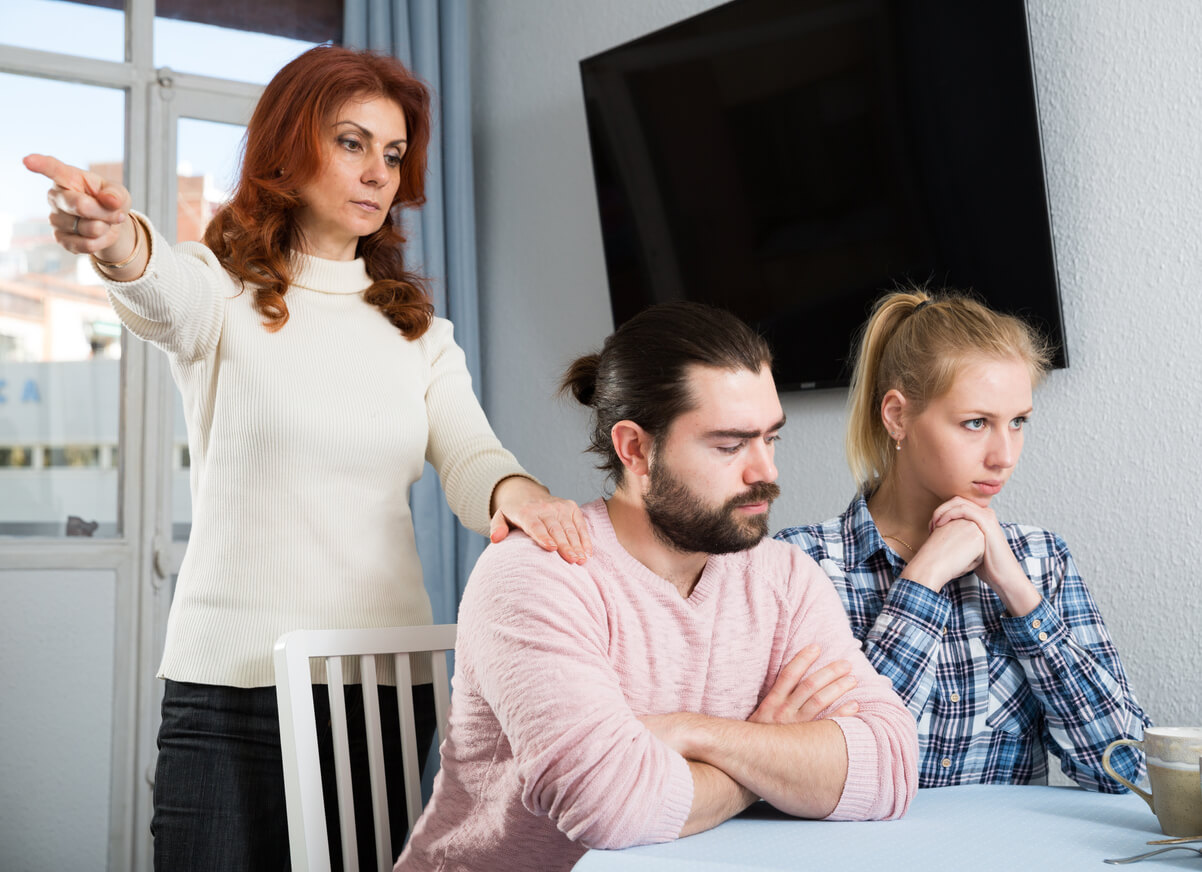What to Do if You Don't Like Your Teenager's Partner


Written and verified by the psychologist Maria Fátima Seppi Vinuales
One of the most difficult tasks associated with parenting perhaps has to do with preparing kids for life. And at the same time, accepting that they may not choose the life we’re preparing them for. In this regard, one of the litmus tests that arise has to do with your teenager’s partner. More than once, parents find themselves in a situation where they experience rejection toward this person who begins to be part of their child’s life. Let’s see how to deal with this situation without harming your relationship with your teenager.
What to do if you don’t like your teenager’s partner
Some recommendations to keep in mind if you don’t like your teenager’s partner are the following:
Ask yourself why you don’t like them
Many times, we don’t like people because we have our own prejudices or distorted images of them. Sometimes we also associate them with a memory from the past or with another person we know and don’t get along with.
So, before making a judgment about someone, it’s good to reflect and ask yourself what your judgments are based on. Your feelings may even coincide with a stage in life when we realize that children are growing up, and this may awaken our fears of being alone and having to rediscover ourselves.

Accept that your child makes their own decisions
As human beings and even more so as adults and parents, placing certain expectations on young people is inevitable. However, it’s also true that it’s important to accept and validate their own choices.
Show respect
We may not agree with our children’s tastes or choices, but our advice should always be given with respect and empathy. Criticizing or judging our teenager’s partner automatically turns us into detractors and establishes emotional distance. It’s always best to encourage dialogue and the exchange of ideas to understand them and get closer to them.
Accept that times have changed
Maybe you don’t like your teenager’s partner because they have nose rings, use expressions that seem strange to you, or are in favor of open relationships. You need to be able to remember that times change and, with them, the ideas and behaviors that young people have. It doesn’t matter what a person wears or how many tattoos they have. What should come first is being able to take care of oneself and share values, which are those that govern our actions.
Give yourself the opportunity to get to know your teenager’s partner.
Before raising an insurmountable barrier, it’s important that you allow yourself to organize a plan where you can talk with your teenager’s partner. This way, you can learn about their likes and interests or how they met, among other things. This is a way to make a person more real and give less room to our prejudices.
Understand that bonds are nurtured and take time to develop
It’s also important to know that we all need our own time to feel comfortable and confident with others. So, you don’t need to force a relationship and pretend that everything’s fine from the beginning. Maybe you need to get to know each other and meet several times before you’re comfortable. However, this is very different from being unpleasant or negative from the start, which is unacceptable and makes it difficult to build a relationship.
Learn to broaden your view
Perhaps you don’t like your teenager’s partner because you only focus on their negative aspects or on those ideas on which you don’t agree. It’s about being able to understand that, perhaps, you’re not 100% okay with your child’s boyfriend or girlfriend, but that doesn’t mean that you’re unaware of their positive qualities.
You may be interested in: Love and Friendship in Adolescence

If you think your child’s in an abusive relationship
Now, if you think that your teen’s partner is abusive or harmful toward your child, the first thing to do is to stay calm and avoid falling prey to your emotions. It’s important to know that if you get angry or fight with your child, the situation will become more complex. In this case, you run the risk of turning against the child, who’s actually the victim of the situation. On the contrary, what you need to do is talk to them and understand what’s happening in order to offer help.
You may be interested in: 4 Reasons That Lead to Teenage Rebellion
Talk positively and educate your children on values
As we’ve already mentioned, in adolescence, peer groups and their first romantic relationships are of crucial importance for young people. In such bonds, they feel supported and begin to find their identities. Therefore, trying to attack or go against their decisions can be counterproductive. This will only alienate you from your child.
In this regard, it’s essential that you avoid becoming a “behavior police” and reproving every single thing your teenager’s partner does. Instead, it’s about being able to teach your child values and point out desired behaviors that can help them feel better. The ultimate goal is for your child to learn to decide for themselves what kind of bonds they want and differentiate between healthy relationships and those that are toxic.
If we’re always critical, not only will they understand that we dislike their partner but will also feel attacked themselves in terms of their decisions.
One of the most difficult tasks associated with parenting perhaps has to do with preparing kids for life. And at the same time, accepting that they may not choose the life we’re preparing them for. In this regard, one of the litmus tests that arise has to do with your teenager’s partner. More than once, parents find themselves in a situation where they experience rejection toward this person who begins to be part of their child’s life. Let’s see how to deal with this situation without harming your relationship with your teenager.
What to do if you don’t like your teenager’s partner
Some recommendations to keep in mind if you don’t like your teenager’s partner are the following:
Ask yourself why you don’t like them
Many times, we don’t like people because we have our own prejudices or distorted images of them. Sometimes we also associate them with a memory from the past or with another person we know and don’t get along with.
So, before making a judgment about someone, it’s good to reflect and ask yourself what your judgments are based on. Your feelings may even coincide with a stage in life when we realize that children are growing up, and this may awaken our fears of being alone and having to rediscover ourselves.

Accept that your child makes their own decisions
As human beings and even more so as adults and parents, placing certain expectations on young people is inevitable. However, it’s also true that it’s important to accept and validate their own choices.
Show respect
We may not agree with our children’s tastes or choices, but our advice should always be given with respect and empathy. Criticizing or judging our teenager’s partner automatically turns us into detractors and establishes emotional distance. It’s always best to encourage dialogue and the exchange of ideas to understand them and get closer to them.
Accept that times have changed
Maybe you don’t like your teenager’s partner because they have nose rings, use expressions that seem strange to you, or are in favor of open relationships. You need to be able to remember that times change and, with them, the ideas and behaviors that young people have. It doesn’t matter what a person wears or how many tattoos they have. What should come first is being able to take care of oneself and share values, which are those that govern our actions.
Give yourself the opportunity to get to know your teenager’s partner.
Before raising an insurmountable barrier, it’s important that you allow yourself to organize a plan where you can talk with your teenager’s partner. This way, you can learn about their likes and interests or how they met, among other things. This is a way to make a person more real and give less room to our prejudices.
Understand that bonds are nurtured and take time to develop
It’s also important to know that we all need our own time to feel comfortable and confident with others. So, you don’t need to force a relationship and pretend that everything’s fine from the beginning. Maybe you need to get to know each other and meet several times before you’re comfortable. However, this is very different from being unpleasant or negative from the start, which is unacceptable and makes it difficult to build a relationship.
Learn to broaden your view
Perhaps you don’t like your teenager’s partner because you only focus on their negative aspects or on those ideas on which you don’t agree. It’s about being able to understand that, perhaps, you’re not 100% okay with your child’s boyfriend or girlfriend, but that doesn’t mean that you’re unaware of their positive qualities.
You may be interested in: Love and Friendship in Adolescence

If you think your child’s in an abusive relationship
Now, if you think that your teen’s partner is abusive or harmful toward your child, the first thing to do is to stay calm and avoid falling prey to your emotions. It’s important to know that if you get angry or fight with your child, the situation will become more complex. In this case, you run the risk of turning against the child, who’s actually the victim of the situation. On the contrary, what you need to do is talk to them and understand what’s happening in order to offer help.
You may be interested in: 4 Reasons That Lead to Teenage Rebellion
Talk positively and educate your children on values
As we’ve already mentioned, in adolescence, peer groups and their first romantic relationships are of crucial importance for young people. In such bonds, they feel supported and begin to find their identities. Therefore, trying to attack or go against their decisions can be counterproductive. This will only alienate you from your child.
In this regard, it’s essential that you avoid becoming a “behavior police” and reproving every single thing your teenager’s partner does. Instead, it’s about being able to teach your child values and point out desired behaviors that can help them feel better. The ultimate goal is for your child to learn to decide for themselves what kind of bonds they want and differentiate between healthy relationships and those that are toxic.
If we’re always critical, not only will they understand that we dislike their partner but will also feel attacked themselves in terms of their decisions.
All cited sources were thoroughly reviewed by our team to ensure their quality, reliability, currency, and validity. The bibliography of this article was considered reliable and of academic or scientific accuracy.
- de la Villa Moral, María , & Sirvent, Carlos , & Cuetos, Glenda , & García, Andrea (2017). Violencia en el noviazgo, dependencia emocional y autoestima en adolescentes y jóvenes españoles. Revista Iberoamericana de Psicología y Salud, 8(2),96-107.[fecha de Consulta 6 de Septiembre de 2022]. ISSN: 2171-2069. Disponible en: https://www.redalyc.org/articulo.oa?id=245153986004
- Hernando-Gómez, A., Maraver-López, P., & Pazos-Gómez, M. (2016). Experiencias positivas y
negativas en relaciones de pareja de jóvenes y adolescentes. Revista de Psicología, 25(2), 1-19.
http://dx.doi.org/10.5354/0719-0581.2016.44745
This text is provided for informational purposes only and does not replace consultation with a professional. If in doubt, consult your specialist.








